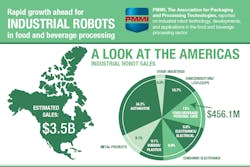Markets Update: Industrial robot sales growing in food and beverage processing
Industrial robot sales in the food and beverage processing market continue to grow and now represent the second largest growth sector behind automotive, according to a new infographic released by PMMI, The Association for Packaging and Processing Technologies.
Industrial robot sales in the Americas are estimated at $3.5 billion, with the market for industrial robots sold into the food, beverage and personal care industry projected at $456.1 million, or 13 percent of all industrial robot sales in the Americas.
Applications for industrial robots are moving into meat processing, fruit and vegetable handling and pick-and-place for processed foods. This expansion is due to technology advances such as end-of-arm tooling or gripping technology, robots being able to withstand hygienic and harsh conditions, the introduction of collaborative robots, easy programming and setup, flexibility and advances in artificial intelligence.
Chemical industry contributes $5.7 trillion to global GDP
The international chemical industry makes an estimated $5.7 trillion contribution to global economic output — 7% of world GDP — through direct, indirect and induced impacts, according to a new global industry economic impact analysis by Oxford Economics.
Directly, the chemical industry added $1.1 trillion to world GDP and employed 15 million people, making it the fifth-largest global manufacturing sector.
Companies in the chemical industry spent an estimated $3 trillion with their suppliers in 2017. This supply chain spending contributed an estimated $2.6 trillion to global GDP and supported 60 million jobs.
The global chemical industry invested an estimated $51 billion in research and development, supporting 1.7 million jobs and a further $92 billion in economic activity.
Chemical process industry professionals expect growth in 2019
The recent Chem Show Business Outlook Survey distributed to professionals across the Chemical Process Industry (CPI), including chemical and processing manufacturers, equipment suppliers, engineers and plant managers, indicates growth in business prospects and sales throughout 2019. According to survey results, 76 percent of respondents expect to experience sales growth in the coming year, with 81 percent rating the 2019 business climate as good or excellent.
When asked to rate overall industry business prospects heading into 2019, 96 percent of respondents reported positive projections. Of these responses, 23 percent answered "excellent," 58 percent responded "good," and 15 percent responded "fair." Only three percent responded with poor projections. These numbers indicate an increase from the group’s last survey, conducted at the close of 2016, with more than a 12 percent increase in "excellent" business forecasts.
Of the 76 percent of respondents that specified an increase from 2018 business prospects, 56 percent expect to experience growth of more than 5 percent over last year. A total of 19 percent expect business to remain steady at the same rate.
New data monetization business models to expand growth opportunities for smart data solution providers, finds Frost & Sullivan
Advancements in data processing tools and adoption of next-generation technologies such as augmented analytics to extract insights from Big Data are expected to drive the smart data market toward $31.5 billion by 2022, according to the market research firm Frost & Sullivan.
Augmented analytics automates data insights and provides clearer information, which is not possible with traditional analysis tools. Companies such as Datameer, Xcalar, Incorta and Bottlenose are already focusing on developing end-to-end smart data analytics solutions to obtain valuable insights from Big Data.
Markets such as the U.S., the U.K., India, and Dubai have rolled out several initiatives to use Artificial Intelligence (AI) and machine learning-powered data analytics tools to generate actionable insights from open data, according to researchers.
Mining pumps market represents a moderately consolidated landscape
According to a report from Fact.MR, the mining pumps market represents a moderately consolidated landscape, with the collective share of tier 1 and tier 2 players being around 60 to 70 percent. The top six companies in the mining pumps market, namely Xylem, Flowserve Corporation, KSB SE & Co. KGaA, Weir Group, Sulzer Ltd. and Grundfos, hold around 40 to 48 percent share, driven by their robust product portfolios.
The ability of a smart pumping system to achieve efficiency and productivity is enhancing its appeal among mining operators and plant managers. Being an integral part of a mining plant, mining pumps are being increasingly deployed across greenfield and brownfield projects evolving in the mining sector. According to the report, the rising need for convergence of intelligence with pumping systems is leading to widespread embracement of concepts like the Internet of Things (IoT) and Industry 4.0 in the pumping infrastructure.
Fact.MR expects the mining pumps market to grow at a compound annual growth rate (CAGR) of around 2.9 percent between 2018 and 2028.



